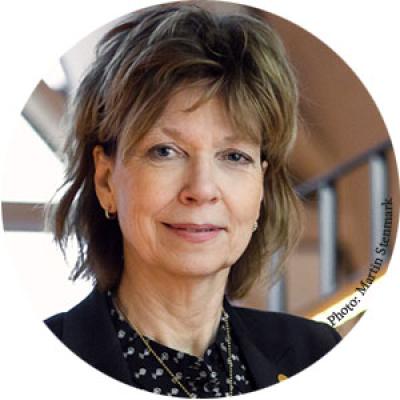ANNIKA ÖSTMAN WERNERSON: The healthcare sector is facing major challenges. With an increasing need for skilled staff, driven up in particular by a changing healthcare sector and advances in biotechnology, all of us in the life science field, at all levels, must apply ourselves and show some creative initiative.
Karolinska Institutet’s ambition is to attract motivated students and, by virtue of our high throughput rate, to contribute to the skills supply. But the skills shortage in healthcare is not remedied solely by training more students; the professional life of the sector’s employees must also be made sustainable so that more graduates choose to stay in the profession.
Lifelong learning
Opportunities must be available for healthcare professionals to build a career and engage in lifelong learning as well as to have the space and resources they need to keep abreast of developments in healthcare, to be inspired and to develop. Students train for three to four years before embarking on a lifetime as a healthcare professional, so while training is naturally an important part of the chain, graduates must also want to remain in their chosen profession.
An important prerequisite to building a career in healthcare is skills development, which staff can access, for example, through the executive and professional education offered by KI. Executive and professional education is not only available to the regions but also to other employers in the country and internationally. Stockholm Region operates a career ladder that gives KI an easier and clearer structure for proposing training programmes as well as opportunities to bring our expertise to the development of training paths.
Greater cooperation among life science actors
It is important that we show our first and second-cycle students their possible future prospects and give them a fuller understanding of the professions available to them. This is something on which we employers can definitely take a collective approach, through such initiatives as joint information campaigns with Region Stockholm, life science companies and the like.
For instance, as a university, we are dependent on needs analyses from the healthcare sector that can provide us with enough data to meet its skills demand most effectively. Sometimes, the range of courses on offer has to be adjusted to match the professional requirements, which may be something that the university itself can do; alternatively, changes can be made to degree objectives or entire professional roles.
Even small changes can make a difference: from radiology nurse to radiographer
One example is the study programme in radiology nursing, where we believe that amending the title of the degree to better reflect the discipline or professional field could be effective. The trained radiology nurse has a licence distinct from that of the nurse, and aligning the title of the profession - radiographer - with international standards could be one way of boosting the supply of skills in this area.

